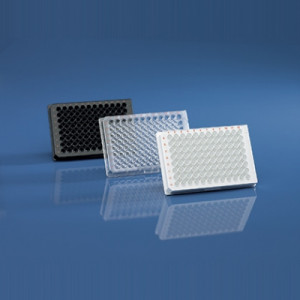BRANDplates® cellGrade™ Tissue-Culture Treated Plates
By Brandtech
BRANDplates® for cell culture are available in a variety of surface treatments for use in the culture of a wide range of cell types. Three different surface treatements, cellGrade™, cellGrade™ plus, and cellGrade™ premium are available for the culture of adherant cells. For cultivation of suspension and stem cells, inertGrade™ microplates are available. All BRANDplates® cell culture plates are sterilized by β-radiation or ethylene oxide, are DNA-, DNase-, RNase-free, and are packaged individually wrapped. Select from a full range of well shapes and colors in 96-, 384- and 1536-well formats. 96-well plates have orange embossed alphanumeric lettering for easy identification of wells.
cellGrade™
A standard plate for the cultivation of adherent cell lines. The surface is hydrophilic compared to untreated polystyrene, with freely-accessible carboxyl and hydroxyl groups. Serum components are easily bound allowing cells to directly attach and spread out quickly and with a better rate of yield.
cellGrade™ plus
For the cultivation of cells in reduced-serum media and fastidious cell lines. In addition to carboxyl and hydroxyl groups, free amino groups are present on the surface for a protein-line composition that allows for direct cellular attachment. Cells adhere faster, spread out, and have a better rate of yield. An excellent choice for sensitive cell lines.
cellGrade™ premium
These premium plates feature surface characteristics for the most demanding cell lines. A Poly-D-Lysine-equivalent, with analogous results regarding cell growth and morphology. Cell adhesion is optimized, reducing cell damage from frequent washing. Serum-free and serum-reduced cultivation is possible. A physical/chemical treatment that has long room-temperature shelf life compared to biological coatings.
inertGrade™
Especially suited for cell cultures when adhesion is not desired. Hydrogel technology optimizes the surface characteristics to suppress interactions of cells or protein with the polystyrene plastic. This reduction of cell adhesion and protein adsorption minimizes enzyme and cellular activation to aid in the inhibition of the differentiation of progenitor or stem cells and promotes the formation of spheroids.
